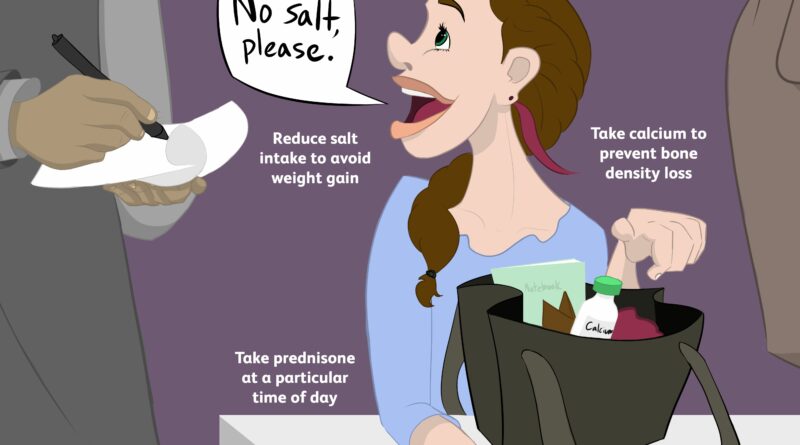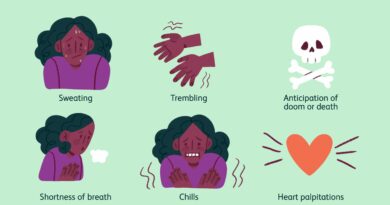What’S the Side Effects of Prednisone
Prednisone is a medication that is used to treat a variety of conditions. It is a corticosteroid, which means it works by reducing inflammation. Prednisone can be taken orally, or it can be injected.
Common side effects of prednisone include weight gain, increased appetite, and difficulty sleeping. Less common side effects include mood swings, irritability, and dizziness.
Prednisone is a corticosteroid that can be used to treat a variety of conditions, including allergies, inflammation, and auto-immune disorders. While prednisone is generally considered safe, there are some potential side effects that users should be aware of. These include weight gain, mood swings, insomnia, and increased appetite.
Prednisone can also increase the risk for osteoporosis and other bone problems. If you are taking prednisone, it’s important to talk to your doctor about the potential risks and side effects.
Prednisone Side Effects – What You Need To Know
What Does Prednisone Do to Your Body?
Prednisone is a synthetic steroid that has been designed to closely resemble the hormone cortisol. It is commonly used as an immunosuppressive drug, which means that it helps to suppress the immune system. Prednisone can be used to treat a wide range of conditions, including allergies, asthma, eczema, and Crohn’s disease.
It can also be used as a preventative measure against organ transplant rejection.
When taken as directed, prednisone is relatively safe; however, there are some potential side effects that should be taken into consideration. These include weight gain, mood swings, increased appetite, and trouble sleeping.
In some cases, more serious side effects can occur such as psychosis or problems with the adrenal glands. If you experience any unusual or severe symptoms while taking prednisone, be sure to contact your doctor right away.
What Should I Avoid While Taking Prednisone?
There are a few things to avoid while taking prednisone, as they can interact with the medication and cause unwanted side effects. These include:
Alcohol: Drinking alcohol while taking prednisone can increase the risk of stomach ulcers and other gastrointestinal problems.
Grapefruit: Grapefruit and grapefruit juice can interfere with how prednisone is metabolized in the body, leading to increased levels of the drug in the blood. This can intensify side effects such as weight gain, fluid retention, and mood swings.
Non-steroidal anti-inflammatory drugs (NSAIDs): NSAIDs like ibuprofen or aspirin can also increase the risk of stomach ulcers when taken with prednisone.
If you need to take an NSAID for pain relief, be sure to talk to your doctor first.
live vaccines: Prednisone suppresses the immune system, so it’s important to avoid live vaccines while taking the drug. This includes vaccinations for measles, mumps, rubella, chickenpox, and shingles.
Talk to your doctor about whether you need any booster shots before starting prednisone treatment.
What are the Side Effects of Prednisone in Adults?
Prednisone is a medication that belongs to the class of drugs known as corticosteroids. It is frequently prescribed by doctors to treat a wide variety of medical conditions, such as allergies, arthritis, asthma, and autoimmune diseases. While prednisone can be an effective treatment for these conditions, it also has a number of potential side effects in adults.
The most common side effects of prednisone include:
• Weight gain
• Increased appetite
• difficulty sleeping
• irritability or moodiness
• bloating or water retention
• acne flare-ups
These side effects are typically mild and resolve on their own once the person stops taking prednisone. However, some people may experience more serious side effects from this medication, such as:
• osteoporosis (bone loss) • cataracts • glaucoma • high blood pressure • diabetes mellitus • ulcers in the stomach or intestine Prednisone can also suppress the immune system and increase a person’s risk of infection. If you are taking this medication, be sure to stay away from people who are sick and wash your hands often to avoid getting sick yourself. If you do develop an infection while taking prednisone, make sure to see your doctor right away so that it can be treated promptly.
How Does Prednisone Make You Feel When You Take It?
Prednisone is a medication that is often used to treat inflammatory conditions such as asthma, allergies, and arthritis. It can also be used to treat some types of cancer. Prednisone works by suppressing the immune system, which can help to reduce inflammation and pain.
Many people who take prednisone report feeling more energetic and less fatigued. Some people also report feeling more anxious or irritable when taking prednisone. These side effects typically go away after a few days of taking the medication.

Credit: health.clevelandclinic.org
What are the Worst Side Effects of Prednisone
There are a number of potential side effects associated with the use of prednisone. While many of these effects are relatively minor and can be easily managed, there are some that can be more serious and even life-threatening. Here is a look at some of the worst side effects associated with this medication:
1. Gastrointestinal problems. Prednisone can cause a number of gastrointestinal problems, including nausea, vomiting, diarrhea, and constipation. In severe cases, it can even lead to ulcers or perforation of the stomach lining.
2. Cardiovascular problems. Prednisone can increase blood pressure and heart rate, which can put strain on the cardiovascular system. It can also contribute to fluid retention, which can further exacerbate these issues.
3. Neurological problems. Prednisone can cause headaches, dizziness, insomnia, and mood swings. In rare cases, it has been linked to seizures and psychosis.
4. Immunosuppression . One of the most serious side effects of prednisone is its ability to suppress the immune system . This leaves patients vulnerable to infections , both viral and bacterial .
Additionally , it increases the risk for developing certain types of cancer .
When Do Prednisone Side Effects Start
Prednisone is a medication that is commonly used to treat a variety of conditions. It is a corticosteroid, which means it works by reducing inflammation. Prednisone can be taken orally or injected, and it can be given for a short period of time or long-term.
Common side effects of prednisone include headache, dizziness, trouble sleeping, and weight gain. These side effects usually start within the first few days of taking prednisone and go away after a week or two. However, some people may experience more serious side effects such as mood swings, irritability, depression, and difficulty concentrating.
If you experience any of these side effects, please contact your doctor.
It is important to remember that prednisone can help to treat a variety of conditions, but it also has potential side effects. If you are considering taking prednisone, please speak with your doctor about the risks and benefits involved.
Prednisolone Side Effects in Adults
Prednisolone is a corticosteroid that is used to treat a wide variety of medical conditions. It is available in both oral and injectable forms. Common side effects of prednisolone include weight gain, increased appetite, and trouble sleeping.
More serious side effects include stomach ulcers, osteoporosis, and high blood pressure. Prednisolone should be used with caution in people with diabetes, heart disease, or liver disease.
How Long Can You Take Prednisone Safely
If you’re taking prednisone, it’s important to know how long you can safely take the medication. Prednisone is a powerful steroid that can have many side effects, so it’s important to be aware of the risks before starting treatment. Here’s what you need to know about the safe use of prednisone.
Prednisone is a glucocorticosteroid medication that is used to treat a variety of conditions, including allergic reactions, asthma, and inflammation. It works by suppressing the immune system and reducing inflammation. The medication is available in pill form or as an injectable solution.
Prednisone is generally safe for most people when taken as directed. However, there are some potential side effects that you should be aware of before starting treatment. These include:
Weight gain
Increased appetite
Insomnia
Irritability
Anxiety
Short-Term Prednisone Side Effects
Prednisone is a medication that is commonly used to treat a variety of conditions. While it is generally safe, there are some short-term side effects that can occur. The most common short-term side effects of prednisone include:
1. Insomnia
2. irritability
3. Mood swings
4. Headaches
5. Increased appetite and weight gain
6. Difficulty concentrating
7. Blurred vision
These side effects are typically mild and go away after a few days or weeks of taking the medication. However, if you experience any of these side effects, be sure to contact your doctor as they may be able to adjust your dose or provide other recommendations.
What is Prednisone 20 Mg Used to Treat
Prednisone is a medication that belongs to a class of drugs known as corticosteroids. It is typically used to treat various conditions such as allergies, asthma, and inflammation. However, it can also be used to treat other conditions as determined by your doctor.
Prednisone 20 mg is the most commonly prescribed dose for adults. The dosage may be different for children and infants. Typically, the starting dose for children is 0.14 mg/kg per day.
The dosage may be increased or decreased based on the child’s response to the medication.
Some of the conditions that prednisone 20 mg can be used to treat include:
-Allergies (including hay fever)
-Asthma attacks
-Skin reactions (such as poison ivy)
What is Prednisolone 5Mg Used for
Prednisolone is a synthetic adrenal cortex hormone. It is used to treat many different inflammatory conditions such as arthritis, lupus, psoriasis, ulcerative colitis, and bronchospasm. Prednisolone 5 mg is a low-dose steroid typically prescribed for short-term relief from allergies or other inflammatory conditions.
Prednisone Side Effects in Women
Prednisone is a medication that is often used to treat a variety of medical conditions. While it can be effective in treating many different conditions, it also has a number of potential side effects. This article will focus on the side effects that have been reported in women who take prednisone.
One of the most common side effects of prednisone is weight gain. This can occur for a variety of reasons, including an increase in appetite and fluid retention. Weight gain can be especially concerning for women who are already overweight or obese.
If you are taking prednisone and notice that you are gaining weight, talk to your doctor about ways to manage this side effect.
Another common side effect of prednisone is mood swings. Women who take prednisone may experience changes in their mood, including feeling irritable, anxious, or depressed.
If you are experiencing any changes in your mood while taking prednisone, talk to your doctor about these symptoms.
Prednisone can also cause problems with menstruation. Women who take prednisone may experience irregular periods or missed periods altogether.
If you are concerned about changes to your menstrual cycle while taking prednisone, talk to your doctor about this possibility.
In addition to the above mentioned side effects,prednisone can also cause other less common side effects such as joint pain, osteoporosis ,and cataracts .If you experience any unusual symptoms while taking prednisone ,be sure to contact your doctor right away .
Conclusion
Prednisone is a medication that can be used to treat a variety of medical conditions. However, like all medications, there are potential side effects associated with its use. The most common side effects include weight gain, increased appetite, mood swings, and difficulty sleeping.
Additionally, prednisone can increase the risk of developing diabetes and osteoporosis. Therefore, it is important to talk to your doctor about the potential risks and benefits of taking this medication before starting treatment.




